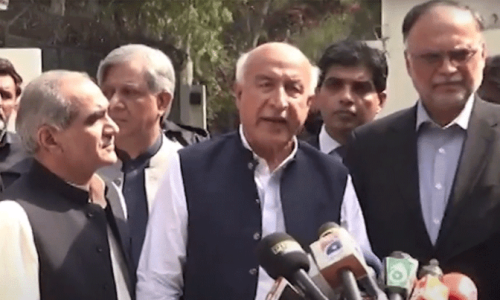ONE of the commonly held beliefs among Muslims is that of a God-given right to polygamy for men. Polygamy is legal in many Asian and African countries. Turkey and Tunisia banned the practice many years ago. In Malaysia, approval from a Sharia court is required. The practice is less common in the subcontinent, perhaps because of economic reasons.
In Pakistan, family law requires written permission from the man’s first wife to marry again. However, many men overlook this and most wives are unaware of this law.
Like many other beliefs, this too is one that has been frozen in time by male scholars, especially of some sects, without consideration of alternative interpretations of Quranic verses or of Hadith and later practices.
Verse 4:3 states: “If ye fear that ye shall not be able to deal justly with the orphans, marry women of your choice, two or three or four; but if ye fear that ye shall not be able to deal justly (with them), then only one … that will be more suitable, to prevent you from doing injustice.”
In Islam, polygamy is an allowance for specific circumstances.
There are two very significant instructions here. The first is that men were allowed to marry more than once, up to a limit of four, in order to take care of the orphans who had been left behind when their fathers were killed: men are asked to marry the mothers of these orphans. The other instruction places a condition of exercising justice and equity among the wives, followed by a statement suggesting that it is likely this will not be possible. In this case, the men are asked to refrain from “doing injustice”.
According to Dr Khaled Abou El Fadl, during the times of the Prophet (PBUH), there were many orphans in Makkan and Madani societies, specifically after the battles of Badr, Uhad and Ahzab. The verse was aimed towards social welfare, rather than satisfying the desires of men. The Quran pays great attention to the welfare of orphans and hence the instruction to support them. Who can say honestly that men today are interested in supporting orphans and to do this, they marry again?
Further, it is not possible for humans to do justice to multiple wives. Equity does not mean wealth: the point here is love, attention and compassion that the Quran calls for between partners in a marriage. Most of the companions had one wife and although the Prophet married many times, he remained loyal to Khadijah for 25 years until her demise. After her, all his marriages were for either political or humanitarian purposes.
Meanwhile, human nature in general requires bonding between partners and this is only possible if this bonding is between couples. When a third person enters this bond, there is a likelihood of breakage of trust, love and companionship. Wives and husbands are compared to being each other’s garments in the Quran, through which they protect each other, hide each other’s weaknesses and provide comfort, compassion and beauty. Had this not been true, God would have created more than one wife for Adam. Does having co-wives enable a woman to have peace of mind, happiness in her union and the desire to give her marriage her whole self, as is required by the Quranic concept of marriage?
Muslim jurists have, over centuries, carried out admirable work in interpreting and developing Islamic laws based on the Quran and Hadith. However, they were all men and their work in fiqh is grounded in patriarchy and favour towards the male. The famous reformist scholar, Mohammad Abduh considered polygamy to be allowed, but restricted to certain conditions. Contemporary scholars such as Dr Fazlur Rahman, Khaled Abou El Fadl, Kecia Ali, Azizah al Hibri and Riffat Hasan are also bringing to light the compassionate and egalitarian content of the Quran.
An oft-ignored piece of Islamic law is the marriage contract that can include various clauses protecting rights of the wife. This can cover binding the husband to a monogamous marriage and equal right of divorce.
A strange message has been circulating on social media. It quotes from a UN report on the number of unmarried girls in Pakistan. The solution suggested by the individual (a man of course) is to promote multiple marriages. However, social and cultural barriers that prevent marriages and efforts need to be addressed. It is also important to educate girls and assist them in becoming effective contributors to national development so that they do not remain dependent on their male relatives. Polygamy is not the answer. It is an allowance in the Quran for specific circumstances.
This could be the right time to undertake a review of how the law allowing multiple marriages is being implemented and ensure necessary measures for peaceful and equitable unions.
The writer is a freelance contributor with an interest in religion.
Published in Dawn, September 4th, 2020














































